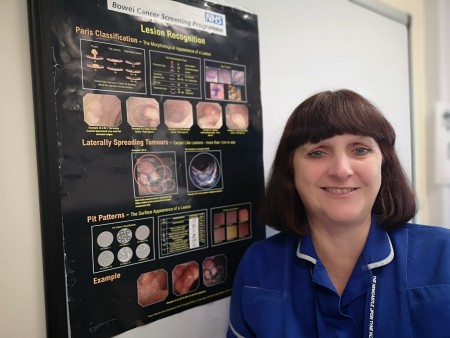Publish date: 4 April 2022
To mark Bowel Cancer Awareness Month Heather Dixon tells us more about her role as a lead specialist screening practitioner

My name is Heather Dixon and I’m the lead specialist screening practitioner working within the bowel cancer screening service at North Tyneside General Hospital. I have been in post since the North of Tyne screening service started which will be 15 years in December. Previously I worked in endoscopy and the development of a new service seemed like a natural progression and really interested me.
The bowel cancer screening programme invites anyone aged 60-74 and registered with a GP to complete a stool kit every two years on their even birthday. If the test is abnormal it means there is blood detected in the sample. The patient will then attend a clinic appointment with a specialist screening practitioner to assess their fitness for a colonoscopy. If they are fit for this procedure the specialist screening practitioner will agree an appointment date and time with the patient and provide them with information regarding the bowel preparation, diet instructions and the consent process.
I also attend the patient’s colonoscopy appointment to act as an advocate for them and collect data which is added to the national Open Exeter system. The data allows the screening centre to see how they are performing against national standards and identify trends within the centre. When the patient’s histology results come through I add them to the data system and inform the patient of the findings. Specialist screening practitioners are also responsible for informing patients of their results and in some cases, having difficult conversations with them. As a team we’re there to provide support to our patients who are going through this journey and ensure they are referred on to the colorectal team for treatment.
The bowel cancer screening programme is currently extending the age range it is offered to so we will begin inviting 58-year-olds for screening from July this year. By 2024 the programme will cover people aged 50-74 which will help patients get a diagnosis earlier and result in better outcomes.
It is proposed that in April 2023 Lynch syndrome surveillance will be conducted within the bowel screening programme. This will bring with it its own set of challenges as we will be dealing with a different cohort of patients with genetic risks of developing bowel cancer. However, it is an opportunity for the team and I to develop our skills and support patients who have inherited this disorder.
Recently the service has developed some easy-read versions of our bowel prep information and we are also in the process of creating instructional videos for patients to access on the trust website, on how to make up the bowel prep. This will help our patients to access the information they need in a way that suits them ahead of their appointment.
What I enjoy most about my job is the patient contact and being able to support them from the beginning to the end of their screening process. As a service we are able to offer advice and answer any questions our patients may have and I love being able to give good news and reassurance to the majority of patients. My work is really varied so every day can be different.
